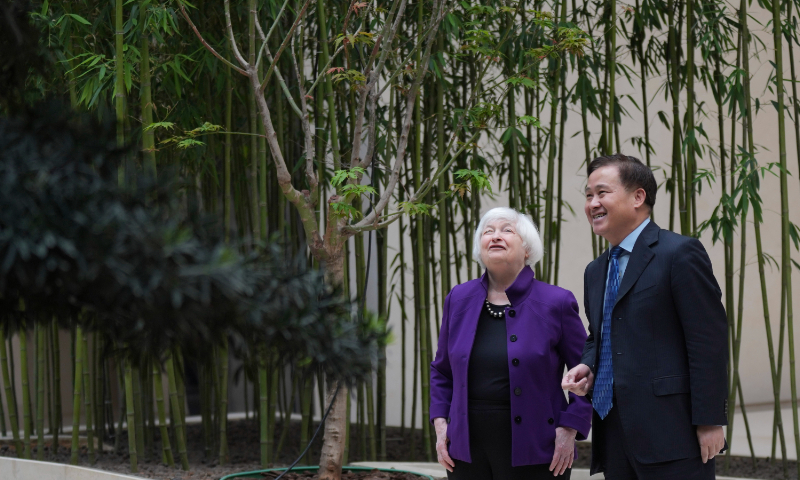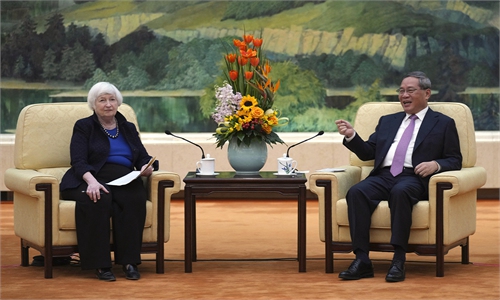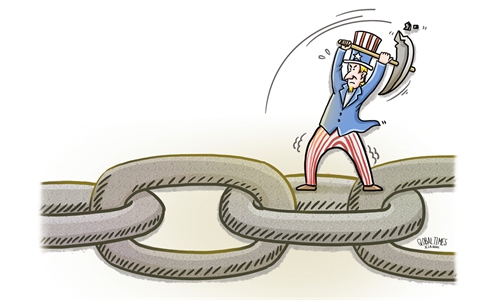China, US to extend exchanges on balanced growth, financial cooperation with new consensus reached during Yellen's visit
Beijing welcomes Washington's move 'not to seek decoupling,' urges practical measures

Governor of the People's Bank of China (PBC) Pan Gongsheng (right) talks with US Treasury Secretary Janet Yellen as they meet at the PBC headquarters in Beijing on April 8, 2024. Photo: VCG
China and the US have reached two new consensuses: extending exchanges on the balanced economic growth of the two countries and the world, and promoting financial stability - among other financial issues - during US Treasury Secretary Janet Yellen's visit to China from Thursday to Tuesday.
The two sides also reiterated the three principles of mutual respect, peaceful coexistence and win-win cooperation, China's Ministry of Finance announced on Monday.
There are two new consensuses - one in the economic sector, one in the financial sector.
The first covers exchanges on balanced growth in bilateral and global economic development under the China-US economic working group mechanism via the guidance of the financial ministries of the two countries.
The second says that the two sides will continuously carry out exchanges in areas including financial stability, sustainable finance and anti-money laundering under the financial working group mechanism guided by the People's Bank of China (PBC), China's central bank, and the US Department of the Treasury, Chinese Deputy Finance Minister Liao Min said on Monday.
The fourth meeting of the China-US economic and financial working groups will be held in mid-April in Washington DC on the sidelines of the spring meetings of the World Bank and IMF, Liao said.
Exchanges in the financial sector have been one of the highlights of Yellen's trip, as she met with multiple senior officials, including Chinese Vice Premier He Lifeng, who are involved in the financial sector, with dedicated discussions.
PBC Governor Pan Gongsheng on Monday also met with Yellen, and the two sides exchanged views on a wide range of economic and financial issues of common concern, ranging from the bilateral financial situation to financial stability and monetary policies, the PBC said in a statement on Monday.
When China's Finance Minister Lan Fo'an and Yellen held a meeting in Beijing on Sunday, the two sides exchanged views on topics including the China-US macroeconomic situation, bilateral economic relations, and cooperation in addressing global challenges, according to a statement released by the Ministry of Finance on Monday.
As the world's two largest economies, China and the US share mutual interests in financial stability and both would be significantly affected by any financial crisis, Hu Qimu, a deputy secretary-general of the digital-real economies integration Forum 50, told the Global Times on Monday.
He said that both sides would benefit from international cooperation and from reaching a consensus on achieving financial stability while preventing further external risks.
Yellen said on Monday that China and the US will hold exchanges on operational resilience in the financial sector and on financial stability, with implications from the insurance sector's exposure to climate risks.
Two more simulations of financial shocks have been scheduled between the two countries, Reuters reported on Monday.
It is necessary if the simulation of financial shocks was to maintain the common financial stability of China and the US, as well as global financial stability, Li Yong, a senior research fellow at the China Association of International Trade, told the Global Times on Monday.
Yellen also reiterated on Monday that the US does not seek to "decouple" from China, as the two economies are deeply integrated, and a wholesale separation would be "disastrous" for both economies.
"Even as we take actions to diversify our supply chains, we seek to preserve the broader trade and investment relationship that can benefit American workers and firms," Yellen told reporters in Beijing.
"China is a key market for American products and services. And competition between our firms can spur greater dynamism and innovation in American industries," Yellen said, according to remarks released by the US Department of the Treasury.
China welcomes the US statement on not seeking "decoupling" from China, while hoping the US will take practical measures to stop sanctioning Chinese enterprises, Liao said.
Experts said that Yellen's visit is a normal exchange under the mechanism formed by the two countries. It also represents the interests of the US business community, which advocates maintaining bilateral economic cooperation.
They said that as the domestic economic problems of the US are prominent, such as high inflation and the possible debt crisis, the US government has a strong demand for economic cooperation with China.
Yellen's visit is an implementation of the San Francisco vision between China and the US. She brings unilateral issues from the US. But these issues must be jointly discussed in a bilateral setting to seek cooperation with China, Li said.
"Meanwhile, multilateral issues are some of the responsibilities and obligations that China and the US, as the world's two largest economies, need to shoulder for the world. On global issues, we need to reach a basic consensus, rather than requiring one side to accept another side's understanding of global issues," Li noted.
The trade relationship between China and the US is the largest worldwide, with a strong foundation for cooperation and complementarity and continued growth potential, Yang Delong, chief economist at the Shenzhen-based First Seafront Fund Management Co, told the Global Times on Monday. He noted that the positive signs showcased by Yellen's visit will enhance market confidence while promoting exports and China's continuous economic revival.



